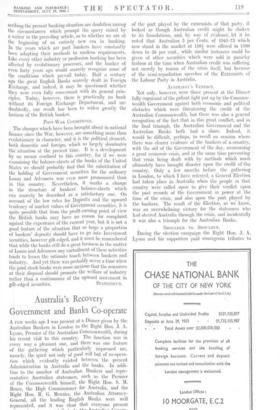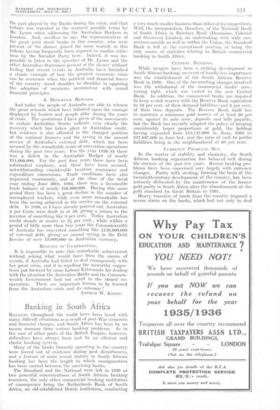Australia's Recovery GoVernment and Banks Co-operate
A rEw weeks ago I was present at a Dinner given by the Australian Bankers in London to the Right Hon. J. A. Lyons, Premier of the Australian Commonwealth, during his recent visit to this country. The function was in every way a pleasant one, and there was one feature of' the gathering which particularly impressed me, namely, the spirit not only of good will but of co-opera- tion which evidently existed between the present Administration in Australia and the banks. In addi- tion to the number of Australian Bankers and repre- sentative Australian statesmen, such as the Premier of the Commonwealth himself, the Right Hon. S. M. Bruce, the High Commissioner for Australia, and the Right Hon. R. G. Menzies, the Australian Attorney- General, all the leading English Banks were well represented, and it was clear that everyone present . • A- A of the part played by the extremists of that party, it looked as though Australian credit might be shaken to its foundations, and, by way of evidence, let it be noted that Australian 5 per Cents. of 1945-75 which now stand in the market at 110f were offered in 1930 down to 58 per cent., while similar instances 'could be given of other securities which were sold in panicky fashion at the time When Australian credit was suffering not merely by reason of the crisis itself, but because of the semi-repudiation speeches of the Extremists of the Labour Party in Australia. - AUSTRALIA'S VERDICT.
Not only, however, were those present at the Dinner fully cognizant of the gallant fight put up by the Common- wealth Government against both economic and political obstacles which were . threatening. the credit of the . Australian Commonwealth, but there was also a general recognition of the • fact that in this great conflict, and in the final triumph, the Australian Government and the Australian. Banks both had a share. Indeed, it would be difficult, perhaps, to recall an ocasion where there was clearer evidence of the bankers of a country, with the aid of the Government of the day, overcoming a great economic crisis, and at the same time preventing that crisis .being dealt with by methods which must ultimately have brought disaster upon the credit of the country. Only a few months before the gathering in London, to which I have referred, a General Election • had taken place in Australia when the people in that country were called upon to give their verdict upon the past records of the Government in power at the time of the crisis, and also upon the part played by the bankers. The result of the Election, as we know, was an overwhelming victory for the statesmen who had steered Australia through the crisis, and incidentally it was also a triumph for the Australian Banks.
• SHOULDER - TO SHOULDER.
During the election campaign the Right Hon. J. A. Lyons and his supporters paid courageous tributes to the part played by the Banks during the crisis, and that tribute was repeated in the warmest possible terms by Mr. Lyons when addressing‘ the Australian Bankers in London. And, needless to say, the representatives of the great joint stock banks in this country, who were present at the dinner, joined the more warmly in this tribute having frequently been exposed to similar critic- isms by the Socialist Party here. Indeed, it was im, possible to listen to the speeches of Mr. Lyons and the other Australian Statesmen present at the dinner without feeling that recent events in Australia have furnished a classic example of how the greatest economic crisis can be overcome when the political and financial forces of the country stand shoulder to shoulder in opposing the adoption of measures inconsistent with sound financial principles.
A DESERVED REWARD.
And today the people of Australia are able to witness the great rewards which have followed ,upon the courage displayed by leaders and people alike during the years Of crisis. The quotations I have given of the movements in certain Australian Stocks indicate very clearly the recovery which has taken place in Australian credit, but evidence is also afforded in the changed position of the national finances and the saving in the annual service of Australia's external debt, which has been Secured by the remarkable series of conversion operations during the past two years. For the year 1930-31 there was a deficit in the Australian Budget of nearly £11,000,000. For the past four years there have been substantial surpluses, and these have been secured, notwithstanding considerable taxation remissions and expenditure concessions. Trade oonditions have also improved enormously, and at the close of the fiscal year ending June 80th, 1934, there was a favourable trade balance of nearly £88,000000. During this same period there has been a great decline in the number of unemployed workers, while even more remarkable has been the saving achieved in the service on the external debt. In 1930, as I have already pointed out, Australian 5 per Cents were dealt in at 58`,' giving a return to the investor of something like 9 per cent. Today Australian credit stands at nearer to 8f per cent., while within a ,f l . period of more than two years the Commonwealth of Australia has converted something like £150,000,000 Of external debt, giving an annual saving in the Debt Service -of over £3,000,000 in Australian currency.
RESULTS OF CO-OPERATION.
It is impossible to note this remarkable achievement without asking, what would have been the course of events, if Australia had failed to deal courageously with her great crisis, and if in repelling the unworthy sugges- tions put, forward by some Labour Extremists for dealing with the situation the Australian Banks and the Common- -Wealth Government had • not acted in the closest co- operation. There are important lessons to he learned from the Australian crisis and its outcome !
Awruint W. KIDDY.



























































 Previous page
Previous page